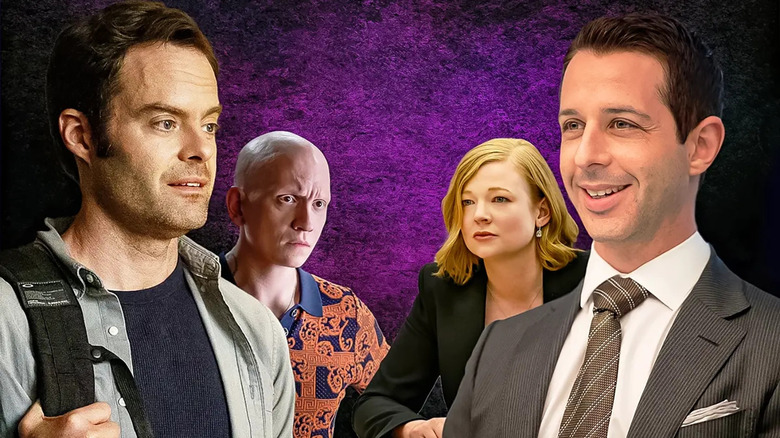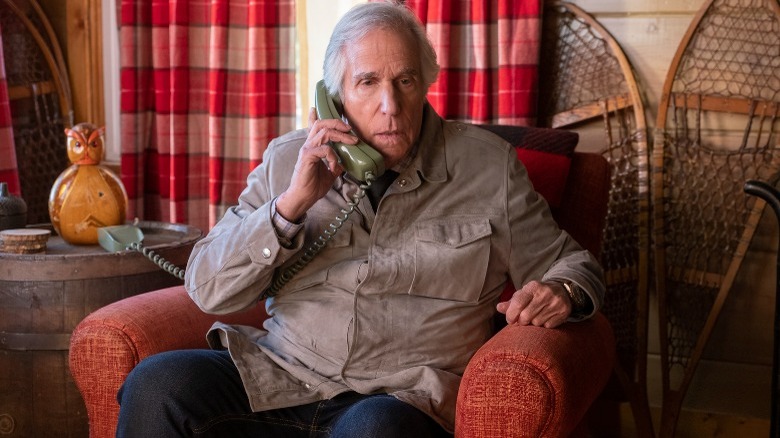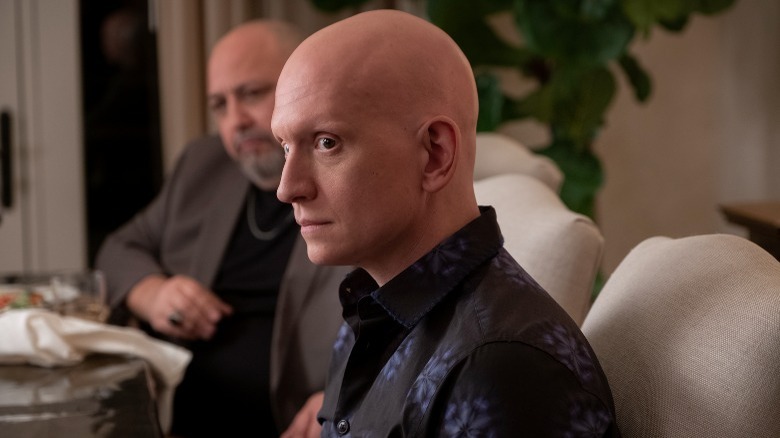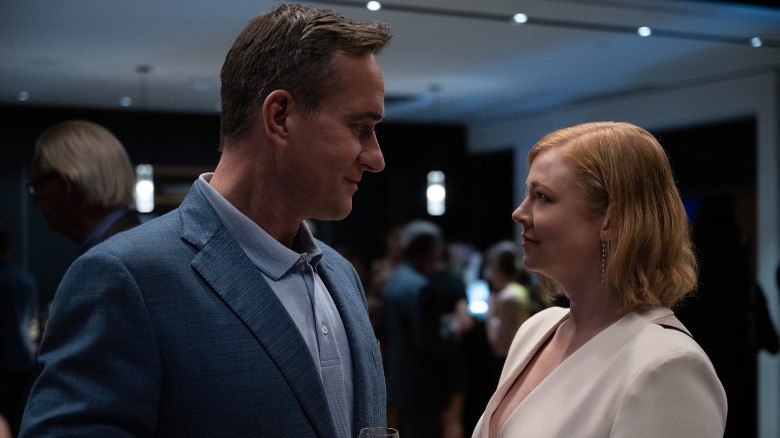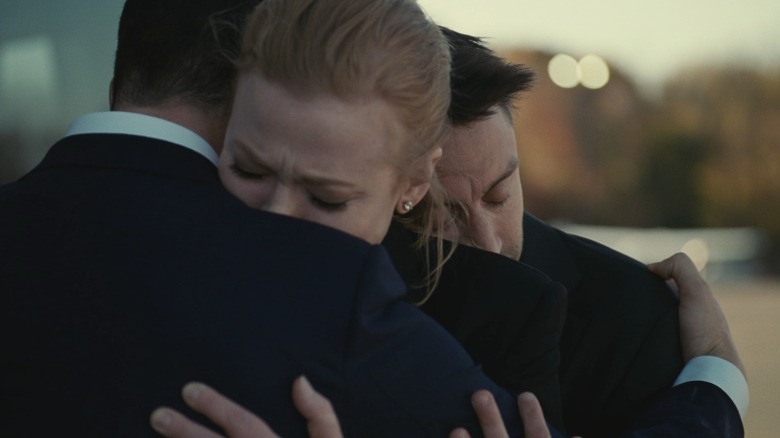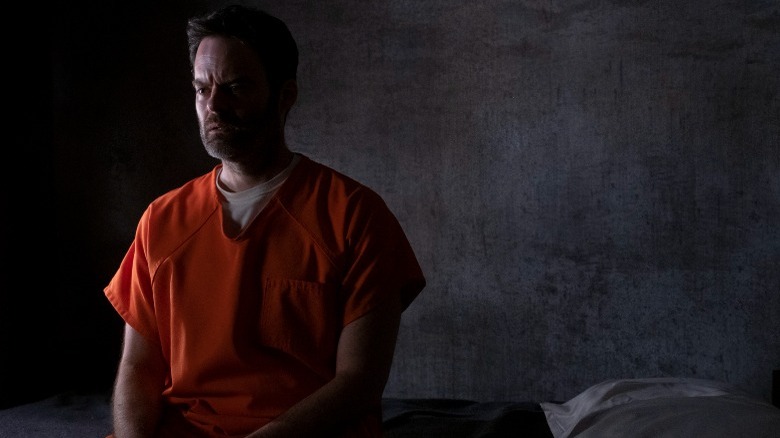Be Prepared: May 28, 2023 Could Be The Greatest Night In HBO History
This post contains spoilers for the fourth seasons of "Barry" and "Succession."
Weekly TV is on a hot streak. Spring 2023 has brought back an avalanche of prestigious, acclaimed shows, and nearly all of them have become appointment viewing for fans. From the thornier, scarier second season of "Yellowjackets" to the polarizing third season of "Ted Lasso" to the bleak yet masterful final runs of "Barry" and "Succession," couch potatoes have been well-fed with a wide range of options that break out of the binge format entirely. In a post-pilot season world, it's a rare run of great TV, and it's due to culminate in an even more rare event this month: "Barry" and "Succession" are set to end on the same day.
That's right: barring any last-minute schedule changes, the two shows that have been responsible for a combined 22 Primetime Emmy wins (and 92 nominations) across the past five years will be taking a bow on the same night. Sunday, May 28, 2023, will be an evening of appointment television for TV fans, as one nail-biting ending is due to be directly followed by another. /Film has also reached out to HBO to confirm today's rumor that "Succession" will bow out with a feature-length goodbye. Regardless, this prestige TV double bill is exciting, thrilling, and, frankly, nerve-wracking.
Twin masterpieces from a network known for them
Both "Succession" and "Barry" arrived in 2018, as HBO appeared to be shoring up its programming slate in preparation for a potential downturn in subscribers after "Game of Thrones" ended a year later. When the fantasy juggernaut bowed out, critics, writers, and industry experts worried that the very concept of live appointment television could bow out with it, but HBO has been able to fill the void with a variety of unexpected hits.
While "Barry" and "Succession" both actually have relatively small live viewerships (the highest-rated episodes of both seem to be in the mid-2 million range) compared to HBO hits like "Euphoria" and "House of the Dragon," the two shows have incredibly engaged fan bases that take to social media to dissect every moment of each new episode. This means that, for fans who watch live, the last Sunday in May is due to be a singularly overwhelming day. It also might be one of the greatest in HBO history.
Since the 1970s, HBO has been a preeminent provider of all things exclusive and premium on TV, but the pay cable network's scripted division really took off in the 1990s. Plenty of fantastic shows have come and gone from the HBO airwaves, some ending with a whimper ("The Wire" remained low-rated throughout its run despite earning praise as one of the best shows of all time) and some with a bang (the cut-to-black end of "The Sopranos" memorably left viewers worried their cable had gone out). The double-billed ending of "Succession" and "Barry" stands out even in comparison to HBO's major moments, though, because both shows can easily be considered among the best of all time, and both are ending on a high note — and on their own terms.
Eleventh-hour twists have us more engaged than ever
"Succession" creator Jesse Armstrong announced the end of his darkly comedic tragedy about a family of ruthless, dysfunctional one-percenters in February. "We could go on for ages and turn the show into something rather different, and be a more rangy, freewheeling kind of fun show, where there would be good weeks and bad weeks," he told The New Yorker, "or we could do something a bit more muscular and complete, and go out sort of strong."
He chose the strong ending, and so far, there's been nothing "sort of" about it. By killing off patriarch and main antagonist Logan Roy (Brian Cox) in the third episode, "Succession" sent shockwaves through its cast of characters — and its audience. Since then, the show has reveled in the sense of discomfort and displacement it's created, taking viewers down unpredictable new avenues as it enters its home stretch.
"Barry," similarly, just blew up its world at its midseason mark, punctuating the fourth episode of season 4 with bloodshed and tragedy before ending it with the dizzying reveal that the show is set to take us years into the future. Series co-creator Bill Hader explained why he made the "structurally radical" fourth season the last one in an interview with Variety in March, expressing similar sentiments as Armstrong. "You realize, well, we could pad a lot of stuff, and just make story," he told the outlet. "But if we're going forward, it ends in season 4."
In final seasons, there's no going back
The ends of "Barry" and "Succession" have a lot in common, from their tragicomic tone to their destabilizing final season twists to the fact that the men behind them announced the conclusions in process-heavy interviews not long before the last seasons premiered. Their most important shared quality, though, seems to be knowing when to quit. Both shows are ending by choice and both shows are bowing out in what could arguably be considered their creative prime. In a TV landscape currently defined by bingeable-but-forgettable content, IP-driven sequels and prequels and reboots, and other various and sundry cash grabs, both Hader and Armstrong seem to understand the wisdom of quitting while ahead.
The final seasons of both shows have worked so well in part because they function as endings. They possess a pervasive no-going-back feeling thanks not only to the events unfolding in front of us each week but also to the soul-baring performances from some of the best actors on TV. Whether we're watching Sarah Snook, Jeremy Strong, and Kieran Culkin unravel in real-time while performing an emotionally devastating scene across a thirty-minute take, covering our eyes while Anthony Carrigan's NoHo Hank begs for his lover Cristobal's (Michael Irby) life, or laughing at the strange comedic edge brought by supporting players like Henry Winkler and Matthew Macfadyen, both shows are delivering career-best performances from nearly everyone involved.
Spoiler etiquette doesn't apply here
They're also shows that have built a reputation on unpredictability, a feature that will make the finale live-watch all the more important. While both shows have smartly built their worlds in a way that makes each new development feel just right (even when emotionally devastating), they've also taken some impressively shocking turns over the years. From Sally (Sarah Goldberg) killing a man to Kendall, well, also killing a man, both shows know how to make us truly feel the weight of their established stakes.
"Succession" in particular is the rare type of event TV that has transcended audiences' ability to hold off on sharing spoilers, with viewers historically prone to blurting out reactions on social media in real-time. The series belongs to a very small club of shows — "Euphoria" and "Game of Thrones" are two others — that have no spoiler etiquette to speak of; any last semblance of such was shattered when the LA Times ran an obituary for Logan Roy moments after episode three aired. All of these factors point to one inevitable conclusion: if you're a TV fan, you're going to want to clear your schedule for Memorial Day weekend.
The sense of an ending
Even though the finale of "Game of Thrones" didn't actually herald the end of event television, there's still plenty of cause for concern among fans of great TV. I don't think weekly TV will go away soon; prestige dramas aside, cable shows like "Yellowstone" pull massive numbers week-to-week, and even the godfather of the binge model, Netflix, seems to be growing somewhat weary of the drop-it-and-forget-it strategy.
But even when other shows rise up to take HBO's coveted Sunday night slot, cornering the market on Monday's watercooler discussion, it's unclear how many of those future series will be this good. The entertainment industry, like all industries, is facing a recession, and the current response from major studios seems to be to greenlight more of whatever raked in a ton of money in the past. This means tacked-on Disney and Pixar sequels, reboots of "Harry Potter" and "Lord of the Rings," and, for some reason, no fewer than four "Billions" spinoffs. Hollywood has always loved its remakes, but any remaining sense of finality in on-screen storytelling seems to be vanishing before our eyes.
It's that loss, perhaps, that makes the simultaneous, planned conclusion of these two smart, original shows feel so important. The ends of "Barry" and "Succession" will almost certainly be riveting and emotional, worthy of whatever debate and praise they inspire. Watched back to back, they'll leave us reeling, overwhelmed, and likely to keep the two shows in conversation for the rest of our lives.
But they'll also serve as a message to an industry that's flagging creatively across the board: weekly appointment television is still alive, and so are fantastic stories that actually end.
